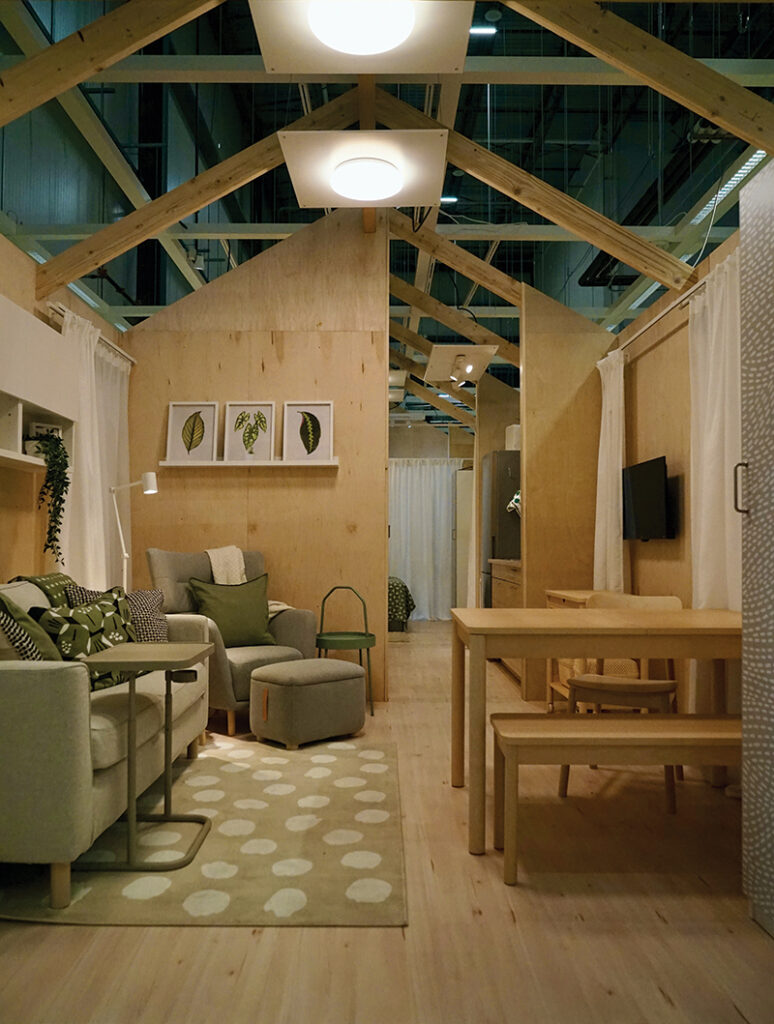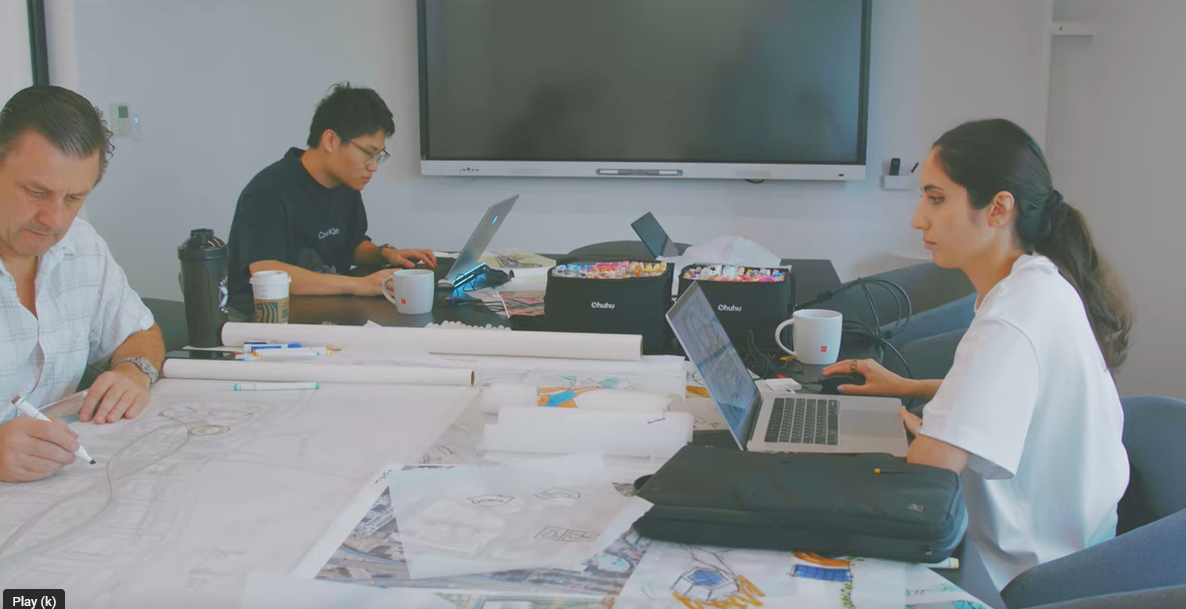Posted on July 17, 2024 by Amanda Cerreto
The UTSA College for Health, Community and Policy has a mission to affect change in communities from local to global. Master of Social Work alumna Sarah Akhtar is taking that mission to heart thanks to her work at WestEast Design’s Social Impact Studio. From her internship, which was leveraged into a full-time job, she helped create a trauma-informed design curriculum that will be put to use in a global company.
WestEast Design is an integrated professional practice that includes architecture, interior design, project management and construction services. The Social Impact Studio at WestEast focuses primarily on homelessness and housing, but also undertakes projects related to child welfare, education, and community centers.
Recently, the Studio partnered with IKEA U.S. to develop a housing unit using trauma-informed design principles for people overcoming homelessness. Akhtar and WestEast took on precedent studies, trauma-informed care research and preoccupancy research, as well as developing a curriculum for trauma-informed training for IKEA employees to implement.
“These types of spaces don’t really exist,” Akhtar explained. “Shelters built for people that experience homelessness are not made with the person in mind, and they can be more traumatizing than helpful. So we knew going into this project that we wanted to intentionally design it to help heal people that are experiencing trauma.”
 Before her work at the Studio, Akhtar could never imagine having an impact on such a scale. As a graduate of UTSA in 2017 with a master’s in clinical and mental health counseling, she pursued a career as a mental health counselor, but quickly realized that the micro level of change was not fulfilling for her.
Before her work at the Studio, Akhtar could never imagine having an impact on such a scale. As a graduate of UTSA in 2017 with a master’s in clinical and mental health counseling, she pursued a career as a mental health counselor, but quickly realized that the micro level of change was not fulfilling for her.
“I could only help my clients so much, because there were other systemic issues that weren’t being addressed,” she said. “I knew I wanted to do something on a bigger scale.”
She returned to UTSA and enrolled in the Master of Social Work program – and felt the difference immediately.
“The social work program has a very strong cultural competency focus, which is really important for me,” she said. “San Antonio is a very diverse city, and I really wanted to continue pursuing that and incorporate that into my career and the type of work that I was doing.”
Born and raised in San Antonio, Akhtar had a strong focus on watering the soil that raised her and working to make positive change in her home city.
“One of the things that stayed with me from the program was when assistant professor Bonita Sharma said, ‘you can't oppress the oppressor,’ – that really stuck with me,” Akhtar recalled. “There's a lot of oppression that occurs systemically on an individual day to day basis. It affects everyone differently. As a social worker, that's what I'm here for them to address.”
Students in the social work program complete several internships and practicums. When Akhtar found WestEast, she knew it was a different kind of company – and one that could help fulfill her desires to create an impact on a larger, systemic scale.
WestEast Design's Social Impact Studio (SIS) is spearheaded by a licensed master's degree social worker, Scott Ackerson, who is dedicated to undertaking comprehensive projects in the realm of human service initiatives. The differentiator for this company is their approach in research-driven designs, particularly in the domain of trauma-informed design.
“This is an amazing opportunity,” Ackerson said. “Combining multi-disciplinary sectors is the only way we are going to solve complex social issues. Right now, this type of interdisciplinary partnership between social work and architecture is an anomaly, in five to ten years I believe it will become the norm.”
 This ambition to serve as a catalyst in addressing social crises is evident in WestEast’s partnership with IKEA. Every aspect of the home – a model of which stands in the IKEA in Live Oak, Texas – is intentionally built with the person in mind. IN addition to an in-store survey available to IKEA customers, the team conducted focus groups and interviewed people who had previous or current experience with homelessness.
This ambition to serve as a catalyst in addressing social crises is evident in WestEast’s partnership with IKEA. Every aspect of the home – a model of which stands in the IKEA in Live Oak, Texas – is intentionally built with the person in mind. IN addition to an in-store survey available to IKEA customers, the team conducted focus groups and interviewed people who had previous or current experience with homelessness.
This feedback included items such as making the floor-length windows shorter for a stronger sense of security, including blackout blinds with curtains and incorporating a bathtub as well as a shower.
The Social Impact Studio will use this feedback to design and construct a Small Home built with trauma-informed design principles, in partnership with IKEA. Akhtar and her team will measure outcomes and gather data, which will aid in advocating for a trauma-informed approach to become the industry standard when developing affordable, supportive housing spaces.
“At IKEA, we believe everyone has the right to a safe, dignified place to call home,” said Samantha Eisenman, sustainability business partner at IKEA U.S. “We see an opportunity to build on the work of those who are already leading in trauma-informed design and using the approach as a part of the shift that builds resilient communities and supportive spaces for the many.”
Another aspect of this project included developing a trauma-informed design curriculum for IKEA to use with their employees. The training will provide IKEA U.S. co-workers with the opportunity to learn about trauma-informed design and how to apply its principles while maintaining a person-centered, empathy-led approach throughout the design process for projects created and implemented within their local markets.
There is not yet a thorough body of evidence-based research surrounding trauma-informed design. WestEast Design is establishing much of that baseline data now, with this and its other community-based projects. Once enough data is gathered, it can influence housing and urban development funding – and even policy.
With that broad vision in mind, Akhtar knows that she is now exactly where she wanted to be when she began her career in social work.
“What’s often missing from the conversation about those experiencing homelessness is a sense of dignity,” Akhtar said. “We want to provide that for them. We also want that to be the precedent, not just WestEast Design, but across the U.S. Everyone deserves a dignified and safe place to live.”

